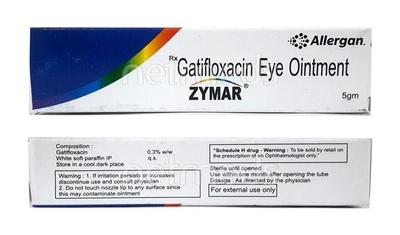

Netmeds First Membership
Quick Links
Introduction About ZYMAR OINTMENT
ZYMAR OINTMENT contains Gatifloxacin which belongs to the group of medicines called Antibiotics. It is used to manage bacterial conjunctivitis caused by strains of aerobic gram-positive bacteria (Ex. Staphylococcus aureus, Staphylococcus epidermidis, Streptococcus pneumoniae, Streptococcus mitis group, Streptococcus oralis) and aerobic gram-negative bacteria (Ex. Haemophilus influenzae).
ZYMAR OINTMENT should be used with caution in pregnant and breastfeeding women as insufficient data is available on this.
ZYMAR OINTMENT is not recommended for children below 1 year of age. Contact your doctor before using.
The most common side effects of using ZYMAR OINTMENT include conjunctival irritation, increased lacrimation, keratitis, papillary conjunctivitis. Contact your doctor if the symptoms aggravate.
Uses Of ZYMAR OINTMENT
- Used to manage bacterial conjunctivitis
How ZYMAR OINTMENT Works
ZYMAR OINTMENT works by inhibiting DNA gyrase (an enzyme that helps in replication, transcription and repair of bacterial DNA) and topoisomerase IV (an enzyme that helps in portioning of chromosomal DNA during bacterial cell division).
How to use ZYMAR OINTMENT
Always use ZYMAR OINTMENT as advised by your physician. The dose and duration of using the medicine will be decided by your doctor depending on your age, body weight and disease severity.
Side Effects Of ZYMAR OINTMENT
Common
- eye irritation
- increased lacrimation
- keratitis
- papillary conjunctivitis
Uncommon
- conjunctival haemorrhage
- dry eye
- eye discharge or pain
- eyelid oedema
- headache
- red eye
- reduced visual acuity
Rare
Stop using ZYMAR OINTMENT and contact your doctor immediately if you experience any of the following side effects:
- anaphylactic reactions (symptoms include eye allergy and allergic dermatitis, nausea, pruritis and blurred vision)
- angioedema
- blepharitis
- dyspnoea
Warning & Precautions
Pregnancy
There is no proper information about the use of ZYMAR OINTMENT in pregnant women. Consult your doctor before using.
Breastfeeding
There is no proper information about the use of ZYMAR OINTMENT in breastfeeding women. Consult your doctor before using.
Allergy
Do not use ZYMAR OINTMENT if you are allergic to Gatifloxacin or any other components of this medicine.
Others
Use in pediatrics:
Use of ZYMAR OINTMENT is not recommended in children below 2 years of age as the safety and effectiveness in this age group has not been established. Contact your doctor before using.
Interactions
A. Drug-Drug Interactions:
Tell your doctor, before applying ZYMAR OINTMENT if you are taking:
- theophylline (manages breathing conditions)
- other quinolones medicines
- warfarin (manages blood clot)
Overdosage:
If you accidentally use too much ZYMAR OINTMENT, contact your doctor immediately.
Synopsis
| Drug | : | Gatifloxacin |
| Pharmacological Category | : | Antibiotics |
| Therapeutic Indication | : | Bacterial Conjunctivitis |
| Dosage Forms | : | Drops, Eye drops, Eye/Ear drops, Ophthalmic solution, Solution, Ointment, tablet, Eye Ointment |
More Information
- Keep ZYMAR OINTMENT out of sight and reach of children
- Store ZYMAR OINTMENT below 25°C
FAQs About ZYMAR OINTMENT
Is ZYMAR OINTMENT safe for use during pregnancy?
ZYMAR OINTMENT should be used with caution in pregnant and breastfeeding women as insufficient data is available on this. Contact your doctor before using.
What are the side effects of ZYMAR OINTMENT?
The most common side effects of using ZYMAR OINTMENT include conjunctival irritation, increased lacrimation, keratitis, papillary conjunctivitis. Contact your doctor if the symptoms aggravate.
What is ZYMAR OINTMENT used for?
It is used to manage bacterial conjunctivitis caused by strains of aerobic gram-positive bacteria (Ex. Staphylococcus aureus, Staphylococcus epidermidis, Streptococcus pneumoniae, Streptococcus mitis group, Streptococcus oralis) and aerobic gram-negative bacteria (Ex. Haemophilus influenzae).
What is the mechanism of action of ZYMAR OINTMENT?
Gatifloxacin works by inhibiting DNA gyrase (an enzyme that helps in replication, transcription and repair of bacterial DNA) and topoisomerase IV (an enzyme that helps in portioning of chromosomal DNA during bacterial cell division).
References
1. K.D. Tripathi. Sulfonamides, Cotrimoxazole and Quinolones. Essentials of Medical Pharmacology. 7th Edition. 2013. Page 713.
2. Chambers HF, Deck DH. Sulfonamides, Trimethoprim, & Quinolones. Basic and Clinical Pharmacology. 11th ed. 2009. Page - 819.
3. Briggs GG, Freeman RK, editors. A Reference Guide to Fetal and Neonatal Risk: Drugs in Pregnancy and Lactation. 10th ed. 2015. Page - 616.
4. Allergan India Pvt Ltd. Gatifloxacin Eye Ointment. [Accessed on 9th Nov 2022] https://allergan-web-cdn-prod.azureedge.net/allerganindia/allerganindia/media/allergan-india/products/zymar-ointment.pdf





